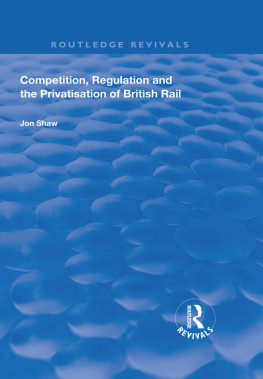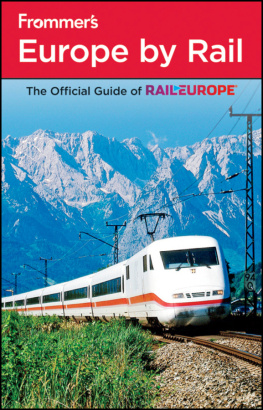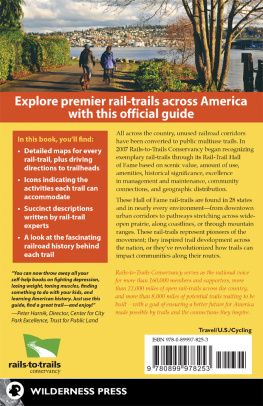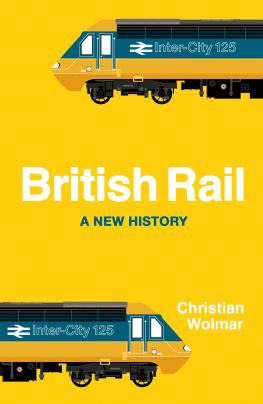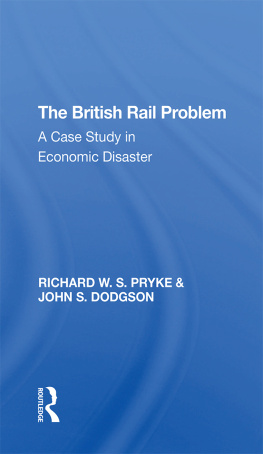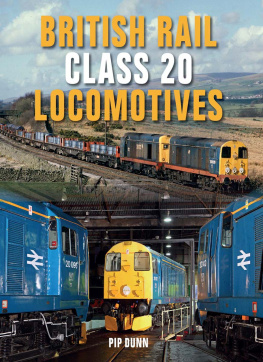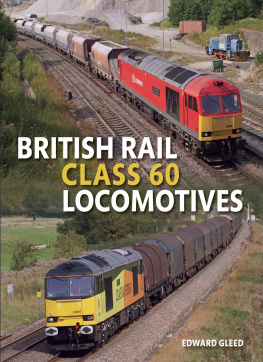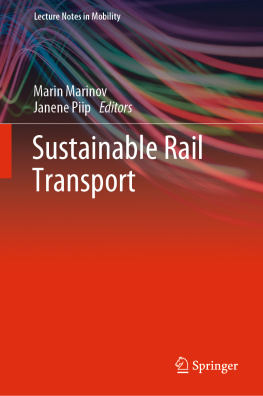Competition, Regulation and the Privatisation of British Rail
Op de vrome, de glorieuze en onsterfelijke herinnering
van Kolonel Puf Puf
First published 2000 by Ashgate Publishing
Reissued 2019 by Routledge
2 Park Square, Milton Park, Abingdon, Oxon, OX14 4RN
52 Vanderbilt Avenue, New York, NY 10017
Routledge is an imprint of the Taylor & Francis Group, an informa business
Copyright Jon Shaw 2000
All rights reserved. No part of this book may be reprinted or reproduced or utilised in any form or by any electronic, mechanical, or other means, now known or hereafter invented, including photocopying and recording, or in any information storage or retrieval system, without permission in writing from the publishers.
Notice:
Product or corporate names may be trademarks or registered trademarks, and are used only for identification and explanation without intent to infringe.
Publishers Note
The publisher has gone to great lengths to ensure the quality of this reprint but points out that some imperfections in the original copies may be apparent.
Disclaimer
The publisher has made every effort to trace copyright holders and welcomes correspondence from those they have been unable to contact.
A Library of Congress record exists under LC control number:
ISBN 13: 978-1-138-73829-4 (hbk)
ISBN 13: 978-1-315-18489-0 (ebk)
| ASI | Adam Smith Institute |
| ATOC | Association of Train Operating Companies |
| BG | British Gas |
| BR | British Rail |
| BRB | British Railways Board |
| BREL | British Rail Engineering Limited |
| BRIS | British Rail Infrastructure Services |
| BRML | British Rail Maintenance Limited |
| BT | British Telecom |
| CCICM | Controlled Competition in Contestable Markets |
| CE | Chief Executive |
| CEGB | Central Electricity Generating Board |
| CI | Compulsory Interavailability |
| CPS | Centre for Policy Studies |
| CRD | Conservative Research Department |
| DETR | Department of the Environment, Transport and the Regions |
| DoT | Department of Transport |
| DTI | Department of Trade and Industry |
| ECML | East Coast Main Line |
| EWS | English, Welsh and Scottish Railway |
| GDP | Gross Domestic Product |
| GNER | Great North Eastern Railway |
| ITT | Invitation to Tender |
| LTS | London, Tilbury and Southend Railway |
| MBO | Management Buy-out |
| MEBO | Management/Employee Buy-out |
| MD | Managing Director |
| MMC | Monopolies and Mergers Commission |
| MoC | Moderation of Competition |
| MP | Member of Parliament |
| MSR | Mode of Social Regulation |
| NAO | National Audit Office |
| NFC | National Freight Corporation |
| NRES | National Rail Enquiry Service |
| Offer | Office of Electricity Regulation |
| Ofgas | Office of Gas Supply |
| OforQ | Organising for Quality |
| Oftel | Office of Telecommunications |
| Ofwat | Office of Water Services |
| OIG | Objectives, Instructions and Guidance |
| OPRAF | Office of Passenger Rail Franchising |
| ORCATS | Operational Research Computer Allocation of Tickets to Services |
| ORR | Office of the Rail Regulator |
| PSBR | Public Sector Borrowing Requirement |
| PSO | Public Service Obligation |
| PSR | Public Service Requirement |
| REC | Regional Electricity Company |
| ROSCO | Rolling Stock Leasing Company |
| RPI | Retail Price Index |
| RPPF | Rail Passenger Partnership Fund |
| SR | Southern Region |
| TOC | Train Operating Company |
| WAGN | West Anglia Great Northern Railway |
I must first and foremost thank Richard Gibb and Clive Charlton for all their help and guidance during the writing of this book. The text would not have been completed or even started, given that they secured the necessary research funding from the Department of Geographical Sciences at the University of Plymouth without their exceptional efforts.
I am also grateful to Ian Bailey, Steve Bennett, Mark Cleary, John Farrington, Sir Christopher Foster, Phil Goodwin, Chris Price, Peter White, Christian Wolmar and some in government and the rail industry who must remain anonymous for their comments and advice on various earlier drafts. Their attention to detail and critical appraisal of the work has immeasurably improved its quality, although of course the usual disclaimer still applies.
Brian Rogers, Tim Absalom, Ian Stokes and Jamie Quinn no doubt found my scribbling rather tiresome but still managed to turn it into artwork. Kate Hopewell provided excellent secretarial support.
Thanks to my parents, Richard and Barbara, and also to Tim, Roland, Matt, Mike, James, Tony, Amanda, Dave and Sam, Stu, Shea and some of those already mentioned above for the swift halves not to mention preposterous pub crawls whilst I was researching and writing the book. The warm welcome and encouragement from my new friends and colleagues in Aberdeen helped ensure that the final preparations went smoothly.
Some of of this book have appeared in revised form elsewhere and I am extremely grateful to the copyright holders, PricewaterhouseCoopers and Taylor and Francis, for allowing the partial reproduction of the work.
Finally, very many thanks indeed to the respondents, who agreed to be interviewed at length about their involvement in, and perceptions of, the rail privatisation process. Their insights were invaluable and I hope they are fairly and accurately represented.
BRIAN GRAHAM ANDRICHARD KNOWLES
Series Editors
The inception of this series marks a major resurgence of geographical research into transport and mobility. Reflecting the critical importance of the dynamic relationships between transport and socio-spatial change, this work includes research on:
- the impacts of liberalisation, privatisation, competition and globalisation on transport policies, networks and strategies
- traffic generation and diversion and the economic impacts of large-scale infrastructure projects such as the Channel Tunnel
- the assessment of environmental sustainability concerns about increasing mobility, dispersal of activity sites and the dependence of transport on fossil fuels and its associated air pollution
- transport, gender and welfare issues
- the relationships between transport and leisure
- congestion and capacity constraints in transport systems.
This monograph series complements the international, quarterly research journal, Journal of Transport Geography (launched in 1993) and Modern Transport Geography (eds Brian Hoyle and Richard Knowles, 2nd ed., 1998 on behalf of the TGRG). Together, these three outlets act as a forum for cutting-edge research into transport and mobility, and for innovative and decisive debates on the formulation and repercussions of transport-policy making.

